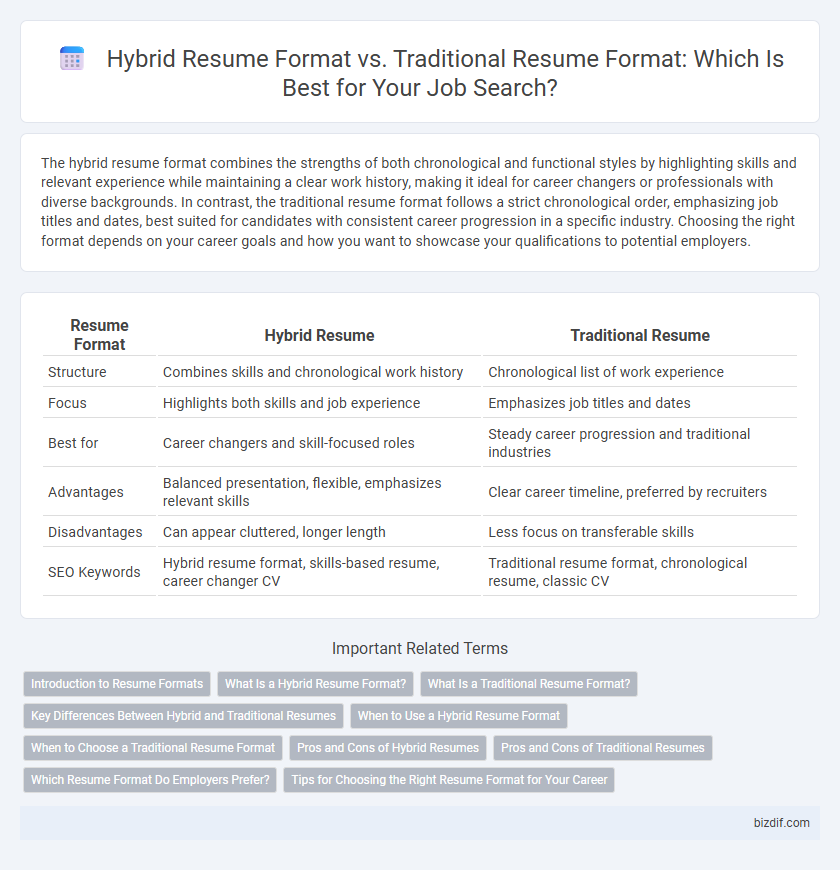The hybrid resume format combines the strengths of both chronological and functional styles by highlighting skills and relevant experience while maintaining a clear work history, making it ideal for career changers or professionals with diverse backgrounds. In contrast, the traditional resume format follows a strict chronological order, emphasizing job titles and dates, best suited for candidates with consistent career progression in a specific industry. Choosing the right format depends on your career goals and how you want to showcase your qualifications to potential employers.
Table of Comparison
| Resume Format | Hybrid Resume | Traditional Resume |
|---|---|---|
| Structure | Combines skills and chronological work history | Chronological list of work experience |
| Focus | Highlights both skills and job experience | Emphasizes job titles and dates |
| Best for | Career changers and skill-focused roles | Steady career progression and traditional industries |
| Advantages | Balanced presentation, flexible, emphasizes relevant skills | Clear career timeline, preferred by recruiters |
| Disadvantages | Can appear cluttered, longer length | Less focus on transferable skills |
| SEO Keywords | Hybrid resume format, skills-based resume, career changer CV | Traditional resume format, chronological resume, classic CV |
Introduction to Resume Formats
Hybrid resume format combines the strengths of chronological and functional formats by highlighting skills while providing a clear work history, making it ideal for job seekers with diverse experience. Traditional resume format emphasizes a reverse-chronological work history, prioritizing consistent employment and career progression to appeal to employers seeking stability. Both formats serve distinct purposes and should be chosen based on individual career goals and industry standards.
What Is a Hybrid Resume Format?
A hybrid resume format combines elements of both chronological and functional resumes, showcasing skills and work experience equally. This format highlights key competencies at the top, followed by a detailed work history, making it ideal for career changers or those with diverse experiences. Employers benefit from a clear view of relevant skills alongside a chronological employment timeline, enhancing resume readability and impact.
What Is a Traditional Resume Format?
A traditional resume format emphasizes a clear, chronological listing of work experience, education, and skills, typically starting with the most recent job. It is favored by employers for its straightforward layout, making it easy to track career progression. This format suits candidates with steady employment histories and clearly defined career paths.
Key Differences Between Hybrid and Traditional Resumes
Hybrid resumes combine the strengths of chronological and functional formats by highlighting relevant skills alongside a clear job history, whereas traditional resumes strictly follow a reverse-chronological order emphasizing employment dates. The hybrid format allows for greater flexibility in showcasing specific achievements and skill sets tailored to the job description, while traditional resumes prioritize straightforward, time-based work experience presentation. Employers often prefer hybrid resumes for their balanced approach to skills and experience visibility, especially in competitive or career-changing scenarios.
When to Use a Hybrid Resume Format
A hybrid resume format is ideal for job seekers with diverse skills and varied experience, blending chronological work history with a skills-based approach to highlight key competencies. Use a hybrid resume when transitioning careers, showcasing skill sets relevant to the new industry while maintaining a clear professional timeline. This format is especially effective for professionals with gaps in employment or those applying to roles requiring a mix of technical expertise and work experience.
When to Choose a Traditional Resume Format
A traditional resume format is ideal when applying to conservative industries such as finance, law, or government, where simplicity and clarity are highly valued. This format emphasizes a clear, chronological work history, making it easier for hiring managers to track career progression and relevant experience. Choose a traditional resume format when your job history is stable, your most recent role is relevant to the position, and you want to highlight a straightforward, professional presentation.
Pros and Cons of Hybrid Resumes
Hybrid resumes combine chronological and functional formats, effectively highlighting relevant skills while providing a clear work history, which benefits applicants with diverse experiences or career changes. They improve keyword optimization for applicant tracking systems (ATS) but can appear cluttered if not well-organized, potentially confusing hiring managers. Balancing detailed skills sections with concise job descriptions is essential to maintain clarity and impact.
Pros and Cons of Traditional Resumes
Traditional resume formats emphasize chronological work history, which provides a clear timeline of career progression for employers. This format is advantageous for candidates with consistent, linear career paths but may highlight employment gaps or frequent job changes negatively. However, it lacks flexibility to showcase skills and accomplishments prominently, which can be a drawback for career changers or those with diverse experiences.
Which Resume Format Do Employers Prefer?
Employers increasingly favor the hybrid resume format for its balanced presentation of skills and chronological work history, allowing for a clearer understanding of a candidate's qualifications and career progression. The traditional resume format remains preferred in conservative industries where a straightforward, chronological timeline highlights stability and experience. Ultimately, tailoring the resume format to the specific industry and job role enhances employer appeal and improves chances of progressing to the interview stage.
Tips for Choosing the Right Resume Format for Your Career
Choosing the right resume format depends on your career goals and work history; a hybrid resume format blends the strengths of both traditional chronological and functional resumes by highlighting skills and experience prominently, ideal for career changers or those with diverse expertise. Traditional resume formats work best for candidates with a steady work history in the same field, emphasizing a clear timeline of roles and accomplishments. Tailoring your resume format to the job description and industry standards enhances your chances of passing applicant tracking systems and catching recruiters' attention.
Hybrid Resume Format vs Traditional Resume Format Infographic

 bizdif.com
bizdif.com